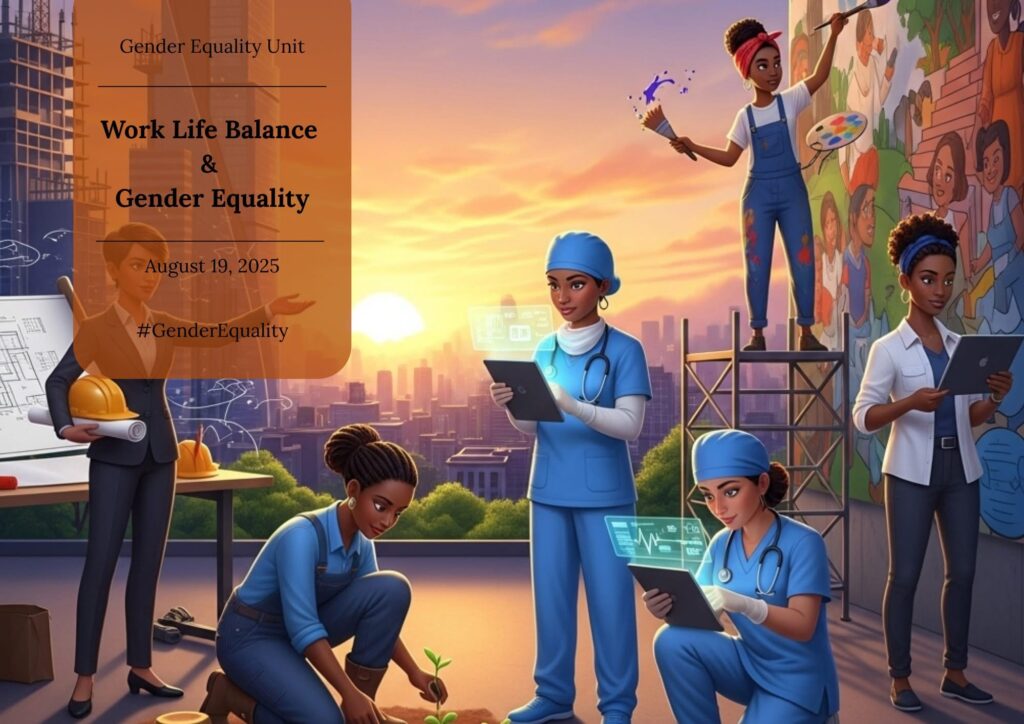Firdaous Initiative for Academic Excellence hosted a webinar on “Work Life Balance & Gender Equality,” featuring insights from Bernice Adeoti, Norah Malambo, and Chibwe Lumpa. The discussion emphasizes the critical intersection of work-life balance and gender equality, highlighting the challenges women face and proposing actionable solutions for individuals, organizations, and society at large.
I. Core Definitions and Interconnectedness
The webinar firmly established the foundational definitions of work-life balance and gender equality and stresses their inherent connection.
- Gender Equality: As defined by Bernice Adeoti, it is “not just about or feminism or being a woman. It has to do with both women and men, having equal access to opportunities, equal access to resources, and as well as decision making. It’s not about making everyone the same, but giving everyone irrespective of their gender irrespective of the background. Giving them a fair chance to travel contributes fully and the workplace.” This emphasizes equity and fair opportunity for all, regardless of gender.
- Work-Life Balance: Adeoti describes this as “an ability to manage your professional life alongside your personal life. So it includes family. It’s includes health. It includes our wellbeing Without necessarily overshadowing each other.” Abdulkareem Azeez further elaborates that a good work-life balance “harmonizes the professional responsibility, which is no well being” allowing individuals “time for family, we have time for his or our own personal health, we have time for personal growth as well as having, you know, a fulfillment in new career goals.”
- The Critical Link: A central argument is that “achieving gender Equality is extremely consistent and is important to ensuring that there is a work, a better work like balance.” Adeoti highlights that women often “carry a double loot, which is Trying to strive at excelling, at work while. Also, making sure that we show that the book of caregiving and also responsibility in the owners.” Without supportive structures, this imbalance “can hold women down. As well as preventing organization from benefiting from their full potential.” The speakers collectively argue that gender equality is not a niche issue but “a human issue. It is a development issue as well as an organizational issue.”
II. Challenges Faced by Women
The speakers identified several pervasive challenges that hinder women’s work-life balance and career progression, often rooted in societal and cultural norms.
- Underrepresentation in Leadership (The “Glass Ceiling”): Adeoti shares a stark personal example: working in a manufacturing company where “the percentage of women to men or men to women as a case may be 96% to 4.” Only one woman was in the boardroom, unable to be heard due to the overwhelming male presence. This “narrows down to something that will call the glass silly glass. Celine is where the pipeline of Progress…just closes down on each individual.”
- Unequal Pay (“Pay Gap”): Despite doing similar work, women “are earning less than men…because of the fact that you a woman or you don’t have that much strength, you don’t have just bias such as comes with, just sidelining what a woman does in comparison with what a man does.”
- Heavy Caregiving Burden (“Double Load”/”Invisible Workload”): This is a recurring and heavily emphasized theme.
- Adeoti pointed out that women “have that responsibility of taking care of your own. Taking care of your children…it’s a double body and it tends to make a lot of people pick between their career advancements and Your personal life.”
- Norah Malambo reffered to this as the “emotional lab and invisible workload that we carry is never recognizing workplace.” She shared a personal anecdote: “I have a house help, but I prefer cooking my food. So when I get home I have to cook. I have to take care of the kids. I have to make sure that everything is ready for the following day.” This work is often “seen, as it is the responsibility of a woman.”
- Chibwe Lumpa vividly illustrated this with a workshop exercise comparing a day in a man’s life vs. a woman’s life with children. For women, “the paper was not enough. For them to Ted relate, every single thing that they have to do.” This includes waking up earlier, preparing meals, managing household help, school runs during lunch, and rushing home immediately after work. In contrast, men “just focus on the wake” and “find it easier to even leave the office at 9 pm.” Lumpa adds that this caregiving extends beyond children to elderly parents, automatically falling to the wife.
- Stereotypes and Bias: Women who prioritize their careers are “being judged as to assertive. He was being judged as somebody that, you know, if you lead or if you’re in a leadership position, you don’t know how to lead.” These “competing stereotypes can undermines once confidence as a woman.”
- Unconscious biases are deeply embedded in culture and tradition. Adeoti recounts a board meeting where a male attendee, from her tribe, expected her (the youngest in the room and the meeting lead) to stand in deference, despite the meeting already being underway.
- Lumpa shared experiences of older male colleagues (even juniors) expecting women to “serve them” like their wives at home, demanding personal errands or tea. This reflects the deeply ingrained cultural expectation “to want to save me.”
- Limited Support Systems: Historically, women have faced “limited supports limited support in terms of mentorship, in terms of sponsorship in terms of networking.”
- Career Gaps and Discrimination: Norah Malambo noted that women who take time off for childbirth often struggle to re-enter the corporate world due to perceived “career gaps,” highlighting systemic discrimination.
- Sexual and Emotional Abuse: The webinar touched on the difficult issue of women enduring sexual and emotional abuse in the workplace due to their financial dependence (“they need the salary to support their families”). There is “very Low reporting of sexual abuse” due to fear of victimization, blame, public shame, and the perpetrator’s position of power.
III. Consequences of Imbalance and Inequality
The lack of work-life balance and prevailing gender inequality has severe repercussions for individuals and organizations.
- Individual Impact:Burnout and Stress: Women are “stuck in between work and home and then You are stressed, you don’t have time for yourself…they’ll be bent out. They’ll be tired all the time.”
- Mental and Physical Health Issues: These include “anxiety,” “emotional fatigue,” “depression,” “sleep issues,” and overall diminished well-being. Malambo emphasizes, “It is in that moment that you tend to lose yourself as a person and in that moment that recovering yourself is a very very hard process.”
- Reduced Creativity and Productivity: When individuals are tired and stressed, they “cannot think,” “just freeze,” and “become Paris,” affecting their professional output.
- Organizational Impact:Loss of Talent and Innovation: When women are “sidelined,” organizations “hold back the talent that you have,” leading to “a loss of innovation as well as the stunted roots.”
- Lower Productivity and Job Satisfaction: An environment lacking fairness leads to reduced “employee engagement” and “job satisfaction.”
- Financial Costs: Organizations incur “a huge cost” when they do not address work-life balance, impacting productivity and overall success.
IV. Proposed Solutions and the Way Forward
The speakers offer a range of solutions, advocating for systemic changes, individual empowerment, and a shift in mindset.
- Organizational Responsibilities:
- Transparent Policies: Implement “recruitment and promotion should be based on play objectives, clear, criterias that are free from bias.” This means challenging assumptions like “Oh, technically has to be a man.”
- Flexible Work Arrangements: Embrace “remote work,” “flexible hours,” and “job sharing” to provide greater autonomy and balance.
- Inclusive Parental Leave Policies: Adeoti highlighted their initiative to create parental leave for both men and women, acknowledging that it’s about “gender balance.” Malambo criticized the disparity (e.g., 90 days for women vs. 5 days for men in Zambia), arguing that extended leave for men is crucial for shared caregiving. She questions the traditional definition of productivity: “is productive. Honestly, about being at work with for eight hours Definitely? No.”
- Equal Pay Audits: “Conduct regular pay audits,” be “proactive in your adjustments,” and “show that there is real commitment to fairness.”
- Leadership Accountability: Gender equality “cannot just be left to a child, or the admined apartment. The leaders has to model the inclusivity, and the most measure the progress that is being taken.”
- Output-Based Performance Metrics: Shift focus from hours worked to tangible output: “if all your work can be done in two hours under the value, you do after those two hours after week has been done, it’s up to you.”
- Create Safe Spaces and Awareness for Abuse: Organizations should have clear policies and procedures for reporting sexual violations, ensuring protection for victims. There’s a call for open dialogue and awareness about harassment and its impact.
- Challenging Biases and Stereotypes:
- Awareness and Training: “We still need to create that awareness. We still need to create that training that can help. Employees, particularly recognize and challenge their own biases.” This includes unconscious biases ingrained by culture and tradition.
- Representation: “Showcasing women and leadership, you should getting women in technical And strategic rules, you can actually challenge this updated assumptions.” Adeoti mentions a project won due to “Gender inclusivity.”
- Redefining Society and Productivity: Women “can redefine society, we can redefine how people look at us. We can redefine how things are done, because we have so much power.” Productivity should not be limited to the workplace; “how productive are you when you’re home?”
- Individual Empowerment and Support Networks:
- Prioritization (PDCA Cycle): Malambo recommended using tools like the “plan do check act” (PDCA) cycle to “Prioritize your work” and delegate tasks.
- Setting Boundaries (“Ability to Say No”): Malambo stressed the importance of “setting boundaries, the ability to say, no.” She advised, “people can take advantage of you…it is very easy for what manipulate you…our ability to say no is something that is very critical because it will help us to really focus on what matters to really focus on what ads value and eliminate in it, that will not bring us value to our lives.”
- Self-Care and Personal Recovery: “Personally, I go for rent every day…just reconnect with myself just release the stress.” “There is nothing. Wrong with yourself first. There is nothing wrong, put yourself first, how emphasize that?”
- Building Networks and Mutual Support: Adeoti urged women to “continue to build our networks. We need to support one another. It is not a competition. It’s easy collaboration.” Malambo added, “allow someone in your life to just talk to you allow someone in your life to just share some experiences.”
- Refuse to Shrink Back: Women should “refuse to shrink back when opportunities arise, or when we’re giving that Opportunity to move out of our comfort zone.”
- The Crucial Role of Men as Allies:
- Chibwe Lumpa passionately argued: “We need men to be allies…we need the men to step up and realize this and talk to each other about this be better men in women’s lives. Be better husbands be supportive brothers, Yeah, husbands and and friends.” She called on men to “take on, the responsibilities of child care at home and also Look out for their partners, like you need to find out if you if your partner is okay and managing.”
V. Conclusion
The webinar concludes with a powerful call to action. The speakers reminded participants that work-life balance and gender equality are “not just about policies and concepts, there are something that we should commit ourselves to.” The ultimate goal is to build “a workplace where there is fairness there is respect and opportunities are not an ideal or not a dream. They become our daily reality.”
Webinar Recording
For more Information, please contact
Marvellous Akinwumi
Head Gender Equality Unit
Firdaous Initiative for Academic Excellence

